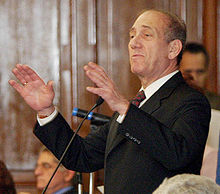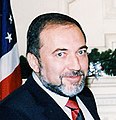Parliamentary election in Israel 2009
- Balad : 3
- Hadash : 4
- Ra'am : 4
- Meretz : 3
- Avoda : 13
- Kadima : 28
- Jisra'el Beitenu : 15
- Likud : 27
- HaBajit haJehudi : 3
- Schas : 11
- United Torah Judaism : 5
- National Union : 4
The 2009 Israeli parliamentary election took place on February 10, 2009, one year before the regular end of the legislative period. The election campaign was marked, among other things, by an Israeli military offensive in Gaza called Operation Cast Lead , which ended with a ceasefire three weeks before election day.
initial situation
After the 2006 election to the Knesset did not produce a clear winner, the two strongest parties, the liberal Kadima and the Israeli labor party Avoda , agreed to form a coalition with the participation of the smaller parties Shas and Gil . Ehud Olmert , who a few months earlier had taken over from the sick Ariel Sharon , remained Prime Minister . After the end of the Lebanon War in September 2006, the nationalist immigrant party Jisra'el Beitenu was accepted as the fifth party in the coalition.
Serious allegations of corruption were made against the Prime Minister during Olmert's reign . In the summer of 2008, Olmert was urged by the coalition partners to resign. He then announced that he would forego the chairmanship of the Kadima. On September 17, 2008, Foreign Minister Tzipi Livni was elected as the new chairman of the Kadima, four days later Olmert announced his resignation as Prime Minister.
Attempts Livnis to continue the coalition government as the new Prime Minister failed due to the resistance of the ultra-orthodox Shas party, which is why President Shimon Peres called new elections in October 2008. The election of the new Knesset had to take place within 90 days according to the electoral law. Ehud Olmert remained in office as managing director.
Election campaign
A total of 33 parties and lists ran for the election of the 18th Knesset. Around 4.8 million eligible voters were called to vote, the parliamentary seats are distributed according to the proportional representation system. Since there is a threshold clause of only two percent in Israel , numerous parties could be expected to enter the Knesset, as always.
After Tzipi Livni failed to form a government, opposition leader Benjamin Netanyahu was expected to shift to the right in favor of Likud . Netanyahu, who did not want to continue the previous peace process with the Palestinians and neighboring Arab states, profited from the escalation of the conflict in the Gaza Strip after the Israeli army responded to the ongoing rocket fire by Hamas with a military action ( Operation Cast Lead ) at the end of December 2008 . Votes were also expected to grow for the nationalist Jisra'el Beitenu (Israel - Our Home) by Avigdor Lieberman . Surveys have given her the prospect of replacing Defense Minister Ehud Barak's Labor Party as the third largest party.
According to the polls in January 2009, Netanyahu was still regarded as the sure election winner, but his lead shrank in the last few days before the election, so that the possible outcome of the election was recently unclear.
Top candidates of the largest parties
Official end result
As of February 18, 2009:
| Political party | Voices 2009 | Share of votes in 2009 in% |
Seats 2009 | Voices 2006 | Share of votes 2006 in% |
Seats 2006 |
|---|---|---|---|---|---|---|
| Kadima | 758.032 | 22.47 | 28 | 690.901 | 22.02 | 29 |
| Likud | 729.054 | 21.61 | 27 | 281.996 | 8.99 | 12 |
| Jisra'el Beitenu | 394,577 | 11.70 | 15th | 281,880 | 8.99 | 11 |
| Avoda | 334,900 | 9.93 | 13 | 472,366 | 15.06 | 19th |
| Schas | 286,300 | 8.49 | 11 | 299.054 | 9.53 | 12 |
| United Torah Judaism | 147,954 | 4.39 | 5 | 147.091 | 4.69 | 6th |
| United Arab List | 113,954 | 3.38 | 4th | 94,786 | 3.02 | 4th |
| National Union (Echud Leumi) | 112,570 | 3.34 | 4th | 224.083 | 7.14 | 9 |
| Chadash | 112.130 | 3.32 | 4th | 86.092 | 2.74 | 3 |
| Meretz-Jachad | 99,611 | 2.95 | 3 | 118,302 | 3.77 | 5 |
| Habajit Hajehudi | 96,765 | 2.87 | 3 | 0 (1) | 0 | 0 |
| Balad | 83,739 | 2.48 | 3 | 72,066 | 2.30 | 3 |
| Gil | 17,571 | 0.52 | 0 | 185,759 | 5.92 | 7th |
| Others (2009 without Gil) | 103.904 | 3.08 | 0 | 182,688 | 5.82 | 0 |
| Valid votes | 3,373,490 | 100 | - | 3,137,064 | 100 | - |
| Election year | Eligible voters | voter turnout | Votes cast | Invalid votes | Valid votes |
|---|---|---|---|---|---|
| 2009 | 5,278,985 | 64.72% | 3,416,587 | 43.097 | 3,373,490 |
| 2006 | 5,014,622 | 63.54% | 3,186,739 | 49,675 | 3,137,064 |
Government formation
After the close election result, both Foreign Minister Livni von der Kadima and opposition leader Netanyahu declared themselves winners. Although the Kadima became the strongest party by one seat ahead of the Likud, the right-wing parties had a majority in the Knesset with 65 of 120 seats thanks to the increase in votes for Lieberman's Jisra'el Beitenu.
Notwithstanding this, Kadima offered the Likud the formation of a government of national unity, but insisted, as in 1984, when Yitzchak Shamir and Shimon Peres formed a grand coalition, at least a rotation of the office of prime minister. Tzipi Livni, however, ruled out participating as a junior partner under Netanyahu.
After Awigdor Lieberman had spoken out in favor of a coalition with the Likud, Netanyahu was officially charged with forming a government by President Peres on February 20, 2009. Despite the secure majority of the right-wing parties, Netanyahu also negotiated with Kadima and Avoda.
As expected, Netanyahu and Lieberman quickly agreed on a collaboration, and the Shas were won as a second coalition partner. On March 24, 2009, Netanyahu and Ehud Barak agreed on a coalition. According to the agreement, the chairman of the Avoda Labor Party would remain Minister of Defense; He also got Netanyahu to promise to adhere to the existing international treaties and to press ahead with the formation of an independent Palestinian state. Avoda's participation in the Netanyahu government sparked criticism from both Likud and the Labor Party. After heated discussions, however, the Avoda agreed to the coalition at a special party conference. On March 25, 2009, Netanyahu concluded the formation of a government with a coalition agreement with the national religious party HaBajit haJehudi ( Jewish Homeland ). The coalition of six holds 69 of the 120 seats in the Knesset. Netanyahu was sworn in as the new Prime Minister on March 31, 2009.
Web links
- Information about the 18th Knesset (Engl.)
- Poll and election results (English / Hebrew)
- The Knesset website with information about the electoral system (English)
Individual evidence
- ↑ Haaretz : Lieberman sworn in as minister after winning Knesset approval ( memento of the original from November 1, 2006 in the Internet Archive ) Info: The archive link was automatically inserted and not yet checked. Please check the original and archive link according to the instructions and then remove this notice. dated October 31, 2006.
- ^ The Press : Israel: Prime Minister Olmert suspected of corruption, May 9, 2008.
- ↑ Die Presse : Olmert turns new elections from June 25, 2008.
- ↑ Die Welt : Prime Minister Olmert announced his resignation on September 21, 2008.
- ↑ Die Welt : Peres gives the green light for new elections in Israel on October 27, 2008.
- ↑ Die Welt : Bad polls for Zipi Livni in Israel from October 27, 2008.
- ↑ Der Tagesspiegel : Likud moves even further to the right from December 9, 2008.
- ↑ Der Tagesspiegel : Israel's right-wingers benefit from the war of February 2, 2009.
- ↑ Süddeutsche Zeitung : The laughing third is called Lieberman ( Memento of the original from February 12, 2009 in the Internet Archive ) Info: The archive link was inserted automatically and not yet checked. Please check the original and archive link according to the instructions and then remove this notice. dated February 9, 2009.
- ^ Spiegel Online : Netanyahu's lead melted on February 6, 2009.
- ^ The State of Israel: Knesset Elections Results. Eighteenth Knesset. February 18, 2009, Retrieved January 23, 2013 (Hebrew).
- ^ The State of Israel: Knesset Elections Results. Eighteenth Knesset. February 18, 2009, accessed January 23, 2013 .
- ^ Neue Zürcher Zeitung : No election winner in Israel from February 11, 2009.
- ↑ The Press : Livni Affirms Right to Government in Israel , Feb.15, 2009.
- ↑ a b Spiegel Online : Netanyahu to form a new government in Israel from February 20, 2009.
- ^ Frankfurter Allgemeine Zeitung : Netanyahu wants to form a grand coalition from February 20, 2009.
- ↑ Tagesschau : Netanyahu wins second coalition partner ( Memento from March 26, 2009 in the Internet Archive ) from March 23, 2009.
- ↑ Tagesschau : Barak's coalition intention divides Labor Party ( memento from March 27, 2009 in the Internet Archive ) from March 24, 2009.
- ↑ Tagesschau : “Ideological bankruptcy declaration” of the Labor Party? ( Memento of March 28, 2009 in the Internet Archive ) of March 25, 2009.
- ↑ Deutsche Welle : Israel: Another right-wing party in Netanyahu's coalition ( memento of the original from December 3, 2011 in the Internet Archive ) Info: The archive link was automatically inserted and not yet checked. Please check the original and archive link according to the instructions and then remove this notice. dated March 26, 2009.





